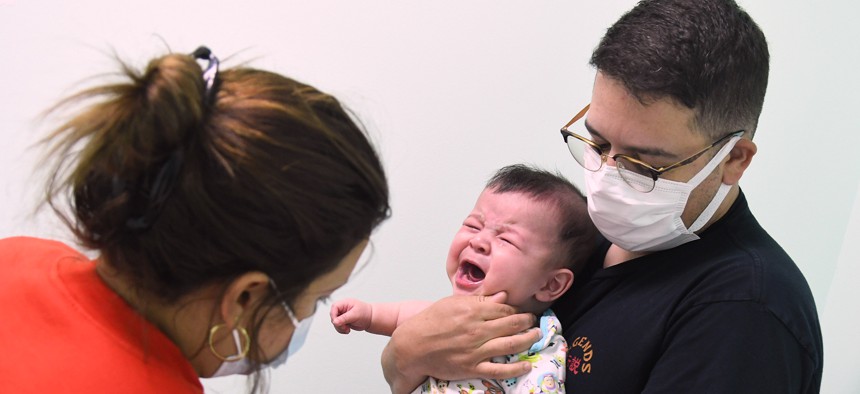Experts question science behind Florida's decision to not order COVID vaccines for kids
President Trump, who oversaw development of the vaccines, has called them 'verifiably safe and effective' and the 'gold standard.'

Adrian Perez looks on while a nurse administers a dose of the Moderna Covid-19 vaccine to his 6-month-old son at Nona Pediatric Center in Orlando, June 24, 2022. On June 18, the Centers for Disease Control and Prevention (CDC) recommended that all children six months to 5 years of age can receive a COVID-19 vaccine. Florida Gov. Ron DeSantis has refused to order vaccine doses for state health departments, making Florida the only state not providing the vaccine for young kids. Photo by Paul Hennessy/SOPA Images/LightRocket via Getty Images
Florida is the only state that hasn’t ordered COVID-19 vaccines for kids under 5, butting heads with the federal government and reducing vaccine access to hundreds of thousands of families. The Florida Department of Health decided to not recommend the vaccines for children, and some experts say the rationale behind the department’s decision is based on misinterpretations and misrepresentations of the studies they cited and issues they discussed in their guidance in March.
The department’s decisions, these experts tell City & State, are based less in science and more in politics, increasing the odds that Florida children get sick with COVID-19. They also say the ongoing rhetoric may push parents away from trusting vaccines in the future, affecting the state’s ability to respond during the next health crisis.
A Department of Health spokesperson has not yet responded to questions for this story. Surgeon General Dr. Joseph Ladapo, the head of the department, has said “that adolescents are at ‘low risk’ from the coronavirus, and testified that there is ‘little data’ on whether children benefit from the COVID-19 vaccines,” the Miami Herald reported. Children younger than 16 who are healthy are “at little to no risk of severe illness complications from COVID-19,” he added.
The department’s official guidance does say decisions to vaccinate children “should be made on an individual basis” and “recommends that children with underlying conditions are the best candidates for the COVID-19 vaccine.” It goes on: “In general, healthy children with no significant underlying health conditions under 16 years old are at little to no risk of severe illness complications from COVID-19. For adolescents 16 to 17 years of age, the risk of myocarditis due to the COVID-19 vaccines may outweigh the benefits.”
The vaccines were the product of Operation Warp Speed, launched in April 2020 under President Donald Trump. It was a multi-billion dollar, public-private partnership to develop and deliver 300 million doses by January 2021. In December 2020, Trump called it a “monumental national achievement,” saying it would “normally take five years, six years, seven years, or even more. In order to achieve this goal, we harnessed the full power of government, the genius of American scientists, and the might of American industry to save millions and millions of lives all over the world.” He added, “The gold standard vaccine has been done in less than nine months.”
Trump went on to call the vaccines “verifiably safe and effective” and “one of the greatest miracles in the history of modern-day medicine.”
‘Higher than anticipated severe adverse events’
One of the reasons for not recommending the vaccine that the Department of Health gave was that in clinical trials with people aged 12-25 there was “higher than anticipated severe adverse events occurred among those receiving the COVID-19 vaccine.” In the study that the department cited, however, no serious adverse events that were related to the vaccine were recorded. Additionally, a similar number of people in the control group and the vaccine group exhibited symptoms (in the 12-15 year age group, 6% in the vaccine group exhibited an event, compared to 5.9% in the control group).
Dr. Andrew Noymer, an epidemiologist at the University of California Irvine whose scholarly focus is on COVID-19, says the difference is not enough to set off alarm bells. Even the difference in the 16-25 year age group (10.8% in the vaccinated versus 8% in the control) didn’t concern him, because the difference between the control and test group was not statistically significant and indicative of people getting sick separate from what was being tested.
“Human beings are fragile,” Noymer says. “So the question is, is it because of the vaccine, or is it just because things happen to people?
The guidance also says one of the reasons for not recommending the vaccine for children was an increased risk of myocarditis in children, in which the heart becomes inflamed. That can lead to an abnormal heartbeat and even a weakening of the heart that makes it harder to pump blood throughout the body. But the study cited by the department did not find occurrence levels of myocarditis higher than normal for the condition.
The study found that about 0.007% of 12-15 males, 0.0105% of 16-17 males, and .0052% in 18-24 males that got the vaccine got myocarditis. However, 0.02% of people nationally get myocarditis every year. Moreover, another study found getting COVID-19 increases the odds someone gets myocarditis to 0.146%, greater than the rate in the study used by the Department of Health. That study also found the odds someone younger than 16 got myocarditis increased 30-fold after getting COVID.
The study cited by the department also was based on data from the CDC’s Vaccine Adverse Event Reporting System (VAERS). Noymer says VAERS data can be useful to identify what issues or potential studies need to be researched, but cannot be the basis for a study alone because the cases on VAERS are self-reported, meaning anyone can report they had a condition and no examinations are conducted to determine whether there is actually a link or not.
“Anyone can report something to VAERS … I could log on to VAERS and submit a bad faith report. It's not medically vetted information,” Noymer says. “It's there to catch hidden pitfalls that evaded detection in the original clinical trial, but it can be used for mischief.”
Dr. Ali Mokdad, an epidemiologist and director of the University of Washington’s Institute for Health Metrics and Evaluation, criticized the Department of Health for continuing to push that there is a greater risk of myocarditis by getting vaccinated than getting the virus itself. “This topic has been studied over and over and over and there is no evidence for it whatsoever,” he says.
Lack of effectiveness with Omicron
The department cited a study showing that the vaccine’s effectiveness at preventing COVID-19 decreased when combating the Omicron variant. Mokdad agreed that Omicron has penetrated vaccine protection more effectively than other variants, but that the vaccine not only makes it less likely people will contract it, but less likely they will have serious symptoms. Research in other states found patients in the state at various age groups were over three times less likely to be hospitalized after getting COVID-19 when they were vaccinated.
The study cited by the department also disagrees with the department’s direction. It concludes by recommending children layer protection by getting vaccinated and wearing masks, something Ladapo also has opposed. The department also says the guidance is based on children being less likely to get severe illness from COVID. Mokdad says that while children under five are less likely to experience serious illness than other age groups, vaccines are still the best way to protect them.
“It’s true, you know, elderly people are more likely to die. People that are obese are more likely to die. That's a true statement,” Mokdad says. “However, do I want my child to be that child that dies? I don’t think so.”
Noymer says that states should play a role in providing that extra protection for parents who want their children vaccinated. “It's clear from my conversations that a lot of families want it for their kids,” he says. “I'm not here to say that Florida should mandate the vaccine for kids. I'm here to say that if parents want their children vaccinated, they should be able to get a vaccine and the state should play a role in making sure that doctors’ offices and pharmacies throughout the state have it.”
Mokdad asks: “Of the kids that have been in the hospital with COVID in Florida, how many of them have been vaccinated? How many have not been vaccinated? I mean, can we look at that? Are they willing to share the data? Are they willing to go and talk about it?”
He says that he and other colleagues are upset with their actions because it is sowing distrust in vaccinations that are safe and have gone through proper testing, which could impact whether parent vaccinate their children for other diseases. “That's what we are concerned about. Where is it going to stop? You are saying this vaccine now. What's next? Are you going to say the HPV vaccine is next?” Mokdad says.
At the institute, Mokdad works on health initiatives across the globe. He says the success of vaccines in the United States that eradicated diseases like polio and measles has caused many to take them for granted because they are not exposed to the horrific impacts of those conditions.
“If you work globally, you see women carrying their kids for two, three hours to bring them to a clinic to get a shot for measles. Why? Because in their village or city many children died,” Mokdad says. “We take a lot of things for granted and we should not anymore. We should be very careful and vaccinate our children.”
